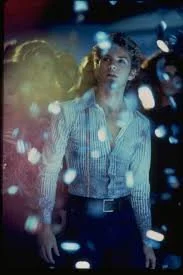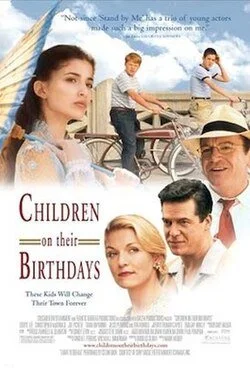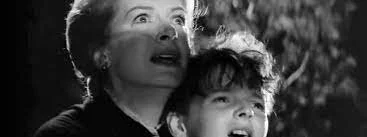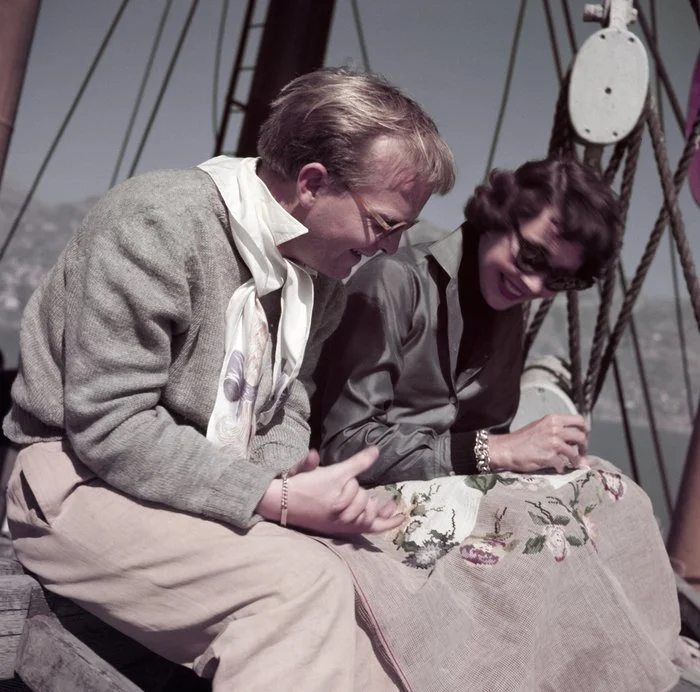These are films that either feature Capote or were written by him. This will be fairly short, despite that it will be about 4 different movies.
54
Remember this movie? Don’t worry about it if you don’t. It’s just okay. I’ve heard that the director’s cut was a better film that gave a more realistic portrayal of the swinging 70s club (apparently Harvey Weinstein demanded the cuts). I regret that I couldn’t find the director’s cut streaming for free as it also has a gross cameo cut out. Ryan Phillippe plays Shane, a bartender with disco fever hired by the club’s owner Steve Rubell (a real person played by Mike Myers). The movie also includes Salma Hayek, Breckin Meyer, Neve Campbell, and a brief scene of Mark Ruffalo as additional young people with celebrity status or trying to obtain celebrity status. The part I want to talk about is in the first ten minutes. Steve stops the music at Studio 54 and calls for Truman Capote (played by Louis Negin in an appropriately ham way). To celebrate Truman’s facelift, Steve has a boy dressed as a golden cupid descend from the ceiling and hand him a mirror. Capote jokingly reaches for the boy and then dances with a man not wearing a shirt. Capote is not the only older person at the disco trying to re-capture their youth through anonymous sexual encounters. The part that made me laugh was Shane confessing he had no clue who Truman was. Of course, Shane doesn’t know any media personalities (not Andy Warhol or Erroll Flynn or half of the people he meets), except Grace Kelly because his mother named his sisters after her.
Real Capote at the real Studio 54
Phillippe at the fake Studio 54
Children on their Birthdays
I’ve read this story by Capote which is yet another one based loosely on childhood experiences. It’s Billy Bob’s 13th Billy Bob (played by Joe Pichler who tragically went missing as an adult, this was his last film). He, his mother (hey, it’s Laura Palmer . . . I mean, Sheryl Lee), and best friend Preacher (look at baby Jesse Plemons) meet a precocious girl named Lily Jane Bobbit (Tania Raymonde). The girls in town hate Lily Jane and the boys all start to compete for her affections. Billy Bob is also upset that his mother is finding love with town mechanic and lawman Speedy (Christopher McDonald) even though his father has been dead for years. He also feels intense shame when he doesn’t stop Preacher from picking on a little Black girl named Rosalba Cat (Brazhal Brewer) and both his mom and Lily Jane see. Unlike the Lily Jane of the story, this Lily Jane comes down from her high horse for the sake of another girl in need of a hero. However, her longing for a life on the stage is the same as in the story. A con man (Tom Arnold) comes to town and convinces Lily Jane that he could make her a star.
I won’t give away the entire plot, but unlike Capote’s other stories of childhood, this one is less about him as a child and more about observations of people through a child’s eyes. However the movie is kinder all around. It makes Lily Jane kinder and more a of child. It makes the interactions between the children and adults more like a coming-of-a-story than a tragedy. And (spoiler alert) it completely changes the ending.
The Innocents
I used to hate this movie as a child because I was literally haunted by the novella The Turn of the Screw. Every time I’d find a Victorian ghost story on TV, it would turn out to be an adaptation of Turn of the Screw. After several years of escaping the story, I finally went back and reread it then re-watched some of those adaptations I was so dogged by. And this is the best version (not counting the Netflix min-series since it does combine a lot of stories). I’m not sure if it was Capote’s idea as the screenwriter or the director’s to make you wonder whether the ghosts were real just like in the original book, but this is the movie where it works the best.
Beat the Devil
This is an odd film that I feel like you need to watch multiple times to get the entire plot. Long story short, Humphrey Bogart, Gina Lollobrigida, Jennifer Jones, Robert Morley, and Peter Lorre star in this story about uranium, land deals, and taking advantage of naive British people (somebody had to). The reason I am including this is not that it’s about writing, but that, despite being based on a book, Capote had to work on the screenplay as they were filming. This probably accounts for plot holes and disjointed scenes. Still, Bogart and Lorre - I’m in. Capote was also all in because he got to hang out with the entire cast.








